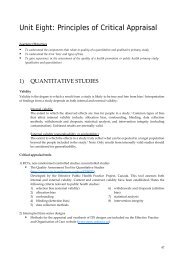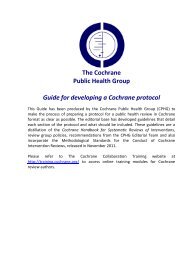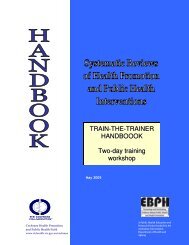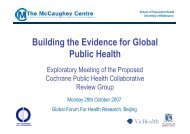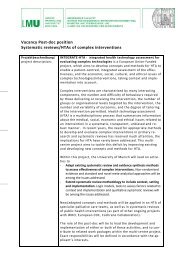Unit Four: Developing a Protocol - Cochrane Public Health Group
Unit Four: Developing a Protocol - Cochrane Public Health Group
Unit Four: Developing a Protocol - Cochrane Public Health Group
Create successful ePaper yourself
Turn your PDF publications into a flip-book with our unique Google optimized e-Paper software.
• Establish an Advisory <strong>Group</strong> whose members are familiar with the topic and include policy,<br />
funders, practitioners and potential recipients/consumers perspectives. Also include<br />
methodologists to assist in methodological questions.<br />
• The broader the review, the broader the experience required of Advisory <strong>Group</strong> members.<br />
• To ensure international relevance consult health professionals in developing countries to identify<br />
priority topics/outcomes/interventions on which reviews should be conducted.<br />
• The Effective <strong>Public</strong> <strong>Health</strong> Practice Project has found that six members on an Advisory <strong>Group</strong><br />
can cover all areas and is manageable.<br />
• Develop Terms of Reference for the Advisory <strong>Group</strong> to ensure there is clarity about the task(s)<br />
required. Tasks may include:<br />
• making and refining decisions about the interventions of interest, the populations to be<br />
included, priorities for outcomes and, possibly, sub‐group analyses<br />
• providing or suggesting important background material that elucidates the issues from<br />
different perspectives<br />
• helping to interpret the findings of the review<br />
• designing a dissemination plan and assisting with dissemination to relevant groups<br />
• Develop job descriptions and person specifications for consumers and other advisors to clarify<br />
expectations. Further information, including how to involve vulnerable and marginalised people<br />
in research, is also available at www.invo.org.uk.<br />
An example of the benefits of using an Advisory <strong>Group</strong> in the planning process<br />
A review of HIV prevention for men who have sex with men (MSM)<br />
(http://eppi.ioe.ac.uk/EPPIWebContent/hp/reports/MSM/MSMprotocol.pdf) employed explicit<br />
consensus methods to shape the review with the help of practitioners, commissioners and<br />
researchers.<br />
An Advisory <strong>Group</strong> was convened of people from research/academic, policy and service<br />
organisations and representatives from charities and organisations that have emerged from and<br />
speak on behalf of people living with, or affected by, HIV/AIDS. The group met three times over the<br />
course of the review.<br />
The group was presented with background information about the proposed review; its scope,<br />
conceptual basis, aims, research questions, stages, methods. Discussion focused on the policy<br />
relevance and political background/context to the review; the inclusion criteria for literature<br />
(interventions, outcomes, sub‐groups of MSM); dissemination strategies; and timescales. Two rounds<br />
of voting identified and prioritised outcomes for analysis. Open discussion identified sub‐groups of<br />
vulnerable MSM. A framework for characterising interventions of interest was refined through<br />
Advisory <strong>Group</strong> discussions.<br />
The review followed this guidance by adopting the identified interventions, populations and<br />
outcomes to refine the inclusion criteria, performing a meta‐analysis as well as sub‐group analyses.<br />
The subsequent product included synthesised evidence directly related to health inequalities.<br />
17



